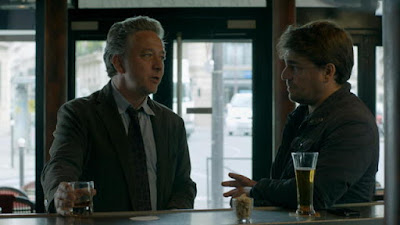My goodness: two new-to-the-USA movies in as many weeks about marijuana used in homemade baked goods! The second of these -- after the recent Dough -- is the 2012 French film, PAULETTE, directed and co-written by Jérôme Enrico and starring one of the old-time treasures of French cinema, Bernadette Lafont (remember Chabrol's Les Bonnes Femmes and Truffaut's Such a Gorgeous Kid Like Me?). Ms Lafont, who died the year after this film was made, had certainly aged some over a career that spanned nearly 60 years and 190 credits, but she had lost none of her power to charm, surprise, move and entertain us. In fact, as this choice role proved, she could still pack European audiences into cinemas and give them a royal good-time.
If M. Enrico, shown at right, whose work is new to me, doesn't break any ground in the feel-good sub-genre of that-crazy/nasty-old-lady-who-turns-out-to-have-a-heart-of-gold, he also plays by the rules cleverly enough to turn out a very smart of piece of entertainment that is plenty easy to sit back on your couch and enjoy. The cinematography by the fine Bruno Privat looks terrific on Blu-ray; everything from the locations to the pastries appears lovely/yummy. And Ms Lafont -- shown on poster, top, below and further below -- charts her moves from harridan to honeybun with great skill and charm.
Paulette, the character, initially takes no prisoners, reducing everyone from the immigrants who took over her failed restaurant to her mixed-race grandson (the adorable Ismaël Dramé, above, right) and black son-in-law with disdain and anger.
How she and her three cohorts -- left to right, below: Carmen Maura, Françoise Bertin and Dominique Lavanant -- get into the drug trade proves quite funny (and about as believable as these kinds of movie ever get), and how they then must move from selling drugs to baking the stuff proves ever funnier and equally smart.
The filmmaker lets more "reality" seep into things than is usual in the genre (note the beating that our heroine takes midway along) and Ms Lafont rises to each new challenge from screenwriter or character (or even the drug-sniffing dog, below) with her usual aplomb.
There is little chance that the movie will veer from its indicated course, so best to just tag along merrily and enjoy. Watch this fine actress move slowly and carefully from reprobate to regenerate is delight enough, and will probably have you scurrying to look up her resume and peruse again some of her wonderful early films.
Among the more pointed barbs the movie offers is its smart look at The French Catholic Church (Paulette's father confessor is played very well by Pascal N'Zonzi, above, left) and the sometimes tricky uses of "donations to the cause."
From Cohen Media Group, and running a sleek 87 minutes, Paulette is out now on DVD and Blu-ray, for sale and/or rental.




























































